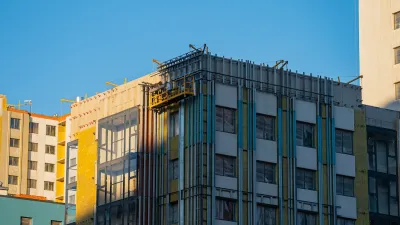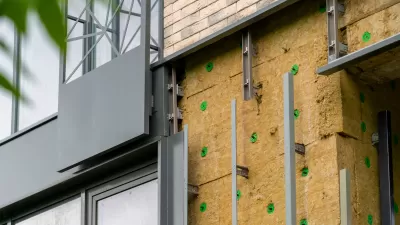Architect David Cook looks at the sustainability craze in building and architecture and warns that calling something "green" doesn't necessarily make it so.
"Increasingly misused in architecture, the term sustainability is in danger of becoming a mere label. In man's relatively short occupation of the Earth, we have succeeded in acutely threatening its future and our habitat. However, we now appear to be gaining a common understanding of the urgency of these matters. Perhaps, for whatever reason, we have finally reached a "tipping point," where we cannot remain in denial. For us sustainability is less a political issue than a humanistic issue; for qualities are just as important as quantities and a "sustainable," or indeed "green," architecture must not solely focus on environmental constraints or pre-defined performance criteria, but also celebrate the wealth and diversity of nature.
Buildings can only be spoken of in sustainable terms if they suit their purpose and are efficient to operate. Otherwise they consume unnecessary resources, are a burden to the owners and risk premature replacement. The process of design requires the consideration of the whole life cycle cost of a building, both in terms of economics and environmental impact; for buildings with a design life of 60 years, the cost of ownership and operation actually far exceeds the cost of construction. Therefore the design approach for any new construction should seek to maximize the efficiency of the building fabric in order to conserve resources in future operation. For us, sustainability in architecture is really about acknowledging the diversity of patterns of use and promoting the wide range of quite subtle, often conflicting, qualities in our built environment. In each project we seek to adopt design strategies which recognize that the building's occupants and their response to their immediate environment as an integral part of these systems."
FULL STORY: Exclusive: David Cook — No, Not the American Idol — Explains What Green Architecture Really Means

Maui's Vacation Rental Debate Turns Ugly
Verbal attacks, misinformation campaigns and fistfights plague a high-stakes debate to convert thousands of vacation rentals into long-term housing.

Planetizen Federal Action Tracker
A weekly monitor of how Trump’s orders and actions are impacting planners and planning in America.

Chicago’s Ghost Rails
Just beneath the surface of the modern city lie the remnants of its expansive early 20th-century streetcar system.

Bend, Oregon Zoning Reforms Prioritize Small-Scale Housing
The city altered its zoning code to allow multi-family housing and eliminated parking mandates citywide.

Amtrak Cutting Jobs, Funding to High-Speed Rail
The agency plans to cut 10 percent of its workforce and has confirmed it will not fund new high-speed rail projects.

LA Denies Basic Services to Unhoused Residents
The city has repeatedly failed to respond to requests for trash pickup at encampment sites, and eliminated a program that provided mobile showers and toilets.
Urban Design for Planners 1: Software Tools
This six-course series explores essential urban design concepts using open source software and equips planners with the tools they need to participate fully in the urban design process.
Planning for Universal Design
Learn the tools for implementing Universal Design in planning regulations.
planning NEXT
Appalachian Highlands Housing Partners
Mpact (founded as Rail~Volution)
City of Camden Redevelopment Agency
City of Astoria
City of Portland
City of Laramie





























